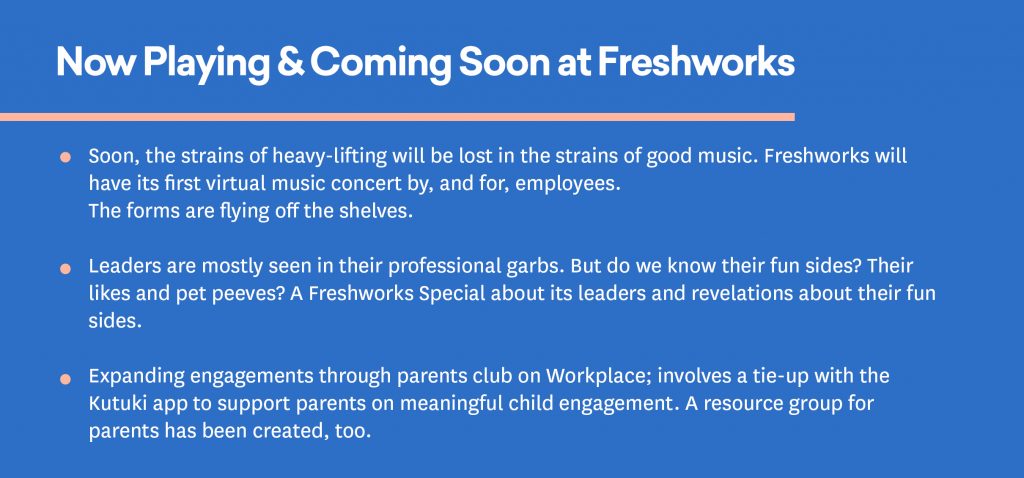What pictionary, trivia, and some banter can do for squads working remotely
When Aashish Kumar first heard about ‘virtual engagements’ in a curiously worded mail, he balked a little.
He had assumed it was an instance of corporate gobbledygook he’d rather do without, considering how swamped he was, clacking away at his laptop from the corner office at home. So, no surprise that he vowed against anything that would even remotely involve staring at screens.
Wind back a quarter. Back in the day, he had to just walk a few paces for a cup of coffee or a conversation with a colleague at the Hyderabad office of Freshworks, where he leads engineering squads. Come to think about it, offices served as a space for collective production in the most efficient physical environment. Every inch did serve a purpose, didn’t it? The meeting rooms for minds to clang and create ideas, the cubicles for undivided attention, the canteens for gastronomical ammo, and, of course, the water cooler for hydration and news collection.
As we get adjusted to the new way of work, an office function, dearly regarded, may have gone away in a silent poof.
Fun.
While the bulk of our time in office was spent enhancing the experience of our products, making them secure, and generally improving their features, haven’t we all had our moments of fun, snatched or willingly given? The time between meetings, on the way to the cafeteria, and the happy hours of Friday Fun, or whatever term your workplace has for it?
Just weeks after the national lockdown in India, where most of the workforce of Freshworks sits, it was this missing facet that hit a few squad leaders and engineering managers.

Germane to engineering teams, and probably among others, is the requirement of a high degree of collaboration, almost every day. For instance, engineers would sit together in a room and hear from product owners/managers about feature enhancement requirements, new rollouts, and recommendations for interface alterations. The tasks would be later assigned to developers in squads and then on to test engineers, trials, deployment, and so on.
At Freshworks, teams engage in “grooming,” basically sessions to just talk about how new features are envisioned and what is required to execute, even before a single line of code is written. The process, then, moves on to 10-day “sprints,” which as the name suggests, is the phase where the actual fast-paced execution takes place.
These tasks are currently happening through video-conferencing sessions done from home-offices. The degree of electronic back-and-forth is tremendous, meaning a high chance of burnout within squads. Which is why in the case of Freshservice, the IT Service Management product from Freshworks, some squads wanted to loosen things up: they called it “virtual engagement sessions.”
Back to Aashish: At the Hyderabad unit of Freshworks, someone had floated an invite for general quizzes, trivia and conversations about the city, life, and all things but work. He had originally thought it to be just another attempt to make working from home a more agreeable affair — something he would rather skip: “With so many chores at home, I was not very keen on another hour before the laptop,” he says.
Nevertheless, purely on a whim and because his curiosity was piqued by the novelty of it, he popped in. He realized it was not bad after all. It helped him brush away the remnants of work overhang in the wake of fun. “Only after a couple of days through the routine did I realize that it worked as a de-stresser. It took my mind off work.”
Now, teams have begun to evolve concepts around similar virtual unwinding sessions. Leaders have separated the ones that work from those that are counter-productive. Aashish says online games involving a lot of action and strategy are ideas in the wrong direction: “The unwinding of work-related pressure cannot involve more wracking of the brains.”
Multiplayer games meant to run for hours wear people out. Light engagements such as Ludo King—derived from the classic Ludo game— work. “If not, just idle conversations about what is going in life work… The idea is to keep them short and light. It becomes engaging only if it’s done in small doses.”
My Internet is frustrating me!
In other teams, too, the need for de-stressers was acutely felt. Sprinting through work items one after the other exacts a toll over time. In Chennai, a Freshservice squad leader, Chan, short from M Chandrasekar, took some steam from a colleague during the daily stand-up video conference. It was just over a week after the lockdown and a team member burst out: “My internet is frustrating me!” Such outbursts were rare.
Earlier, engineers would just book a room in the office for what they called Fun Fridays, a fortnightly event reserved for pictionary, trivia quizzes or just idle banter. Chan wondered if it was time to move the fun parts of work-life online, too.

Now, his eight-member team cools off playing Skribbl, a multiplayer game where one participant draws an image and the others take guesses. Kahoot, a gamified learning platform, is another way to do it. “Every Friday, we used to step out of the office for snacks. That got interrupted. So now, every Friday, we have these fun sessions to keep it going,” says Chan.
Worker tunnels
If you were to visualize how teams are working from home now, it would be something like this: people with laptops sitting in tunnels that link with tunnels of teammates, all of them converging at that of their leaders, who are connected to their peers in the same way, and upward all the way to the C-suite.
It indicates that a remote worker is in touch—to a large degree—only with team members. Not many cross-functional conversations happen, rendering another facet of the physical office impossible. At Freshworks, managers were wondering if something could be done about it: “The ultimate goal is to give employees a happy work environment. We believe the engagement sessions are a step in that direction,” says Umanand Iyappan, Senior Director of Engineering at Freshworks.

How it all started
Just after the national lockdown was imposed in India a quarter ago, the HR business partners at Freshworks and their leaders got in a huddle. Freshworks had gone into work-from-home mode a week ahead of India, meaning nearly three thousand employees had gone remote to work from an equal number of offices (their homes, mostly). The challenge before the HR folks was: How do we make it easy for them?
Among their four areas of focus, Fun had figured as a cornerstone, along with Production and Engagement, Wellness, and Communication.
The instances at the Freshservice squads flowed from the ideation led by Chief Human Resources Officer Suman Gopalan and her colleagues. Nevertheless, teams could make it their own by doing what they preferred to do. The methods were kept deliberately loose: “Fun, as it is, need not be limited to games,” says Deepthi Vinod, an Internal Communications Specialist who also handles the Work-From-Home initiatives at Freshworks. The act of partaking in any community activity that revolves around shared interests could be fun, too.
Clearly, music won hands down as the one with most participation. Listen in to Deepthi as she speaks about how the Freshworks Workplace has spawned myriad communities since lockdown, somewhat resembling a children’s park during a power-cut:

Keeping it light
A simple search would reveal a thousand quick fixes for de-stressing at work. Among the methods is this technique: visual resting spots. Gaze upon something that will act as a comforting nest for your vision, and by extension, your mind. The others are to go for short workouts to rejuvenate the body, get ergonomic chairs, and, maybe, look for sunny and open spots to work from.
Well, the common thread here is that they are techniques to deal with the stressful aspects of work; tricks of the trade, if you may. On their own, they offer little value unless employees are backed by motivation, and empowered to truly join the cause of the organization—to get on a journey toward a goal envisioned by the founders and put into action by the CEO. Another aspect is the curiosity to learn, which is a contributor for innovation. According to this Harvard Business Review article, how well an employee works depends on why they work there, meaning the motive to work is paramount to performance.
The British philosopher Bertrand Russell emphasizes “curious learning” and “useless knowledge” in his collection of essays, In Praise of Idleness. He argues passionately for those who learn with little thought as to whence they will use what they learn. They learn because they’re curious-—he says the taste of peaches and apricots was accentuated after he came to know how the fruit traveled all the way from China, planted in the Han dynasty, through India and crossing Persia, and into the Roman empire: “…trivial pleasures of culture have their place as a relief from the trivial worries of practical life.”
If not a direct parallel, there could be a lesson here. An organization that seeks to foster innovation needs to free the minds of its employees. It should let them shrug off the effects of tiring organizational production. At every turn, practical life tends to dissuade them from seeing the big picture. That is why some relief is required—to help us keep plodding on the path we’ve set for ourselves. Who knows, pictionary, trivia and some banter could provide that tool to keep plodding away until we reach where we were meant to be?



